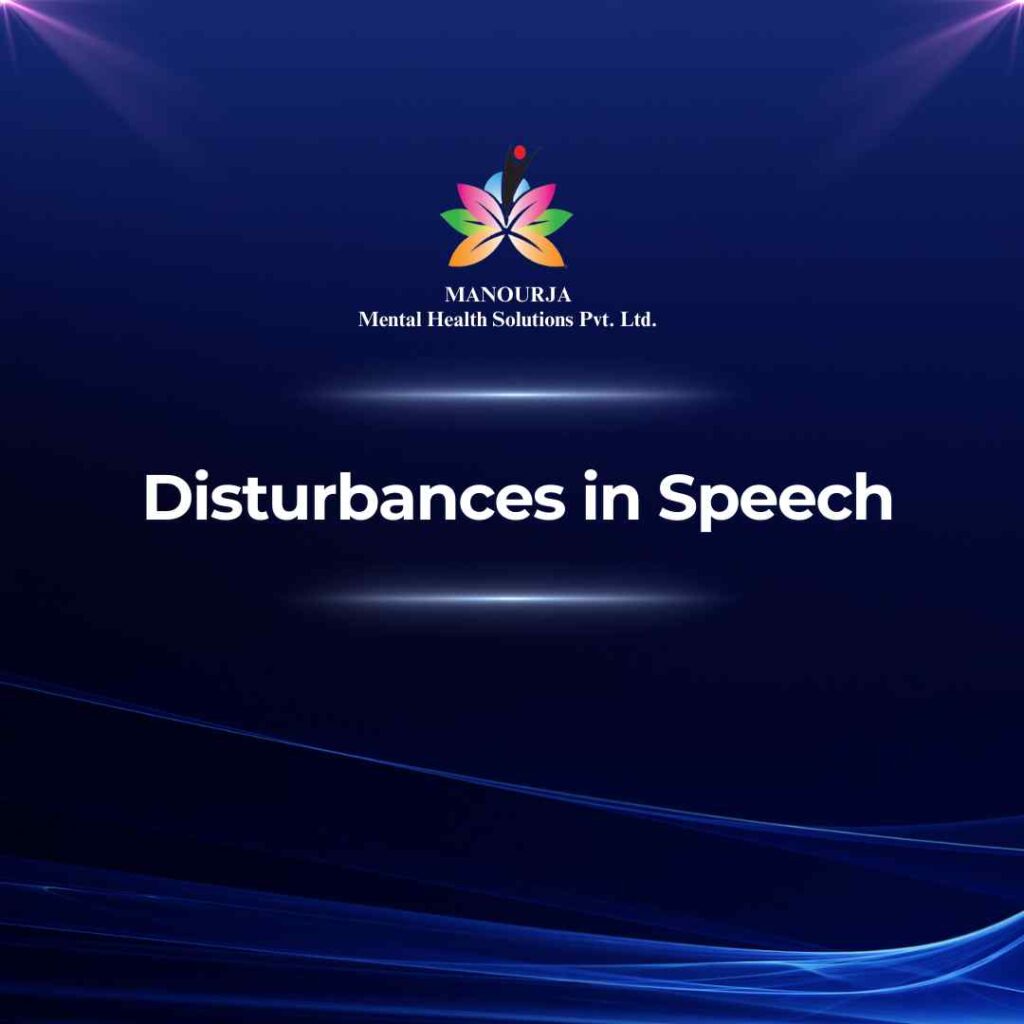Disturbances in Speech

Disturbances in speech refer to abnormalities in the production, flow, and coherence of verbal communication. These disturbances can impact how a person speaks, affecting the clarity, organization, and meaning of their speech. Such disturbances can be indicative of underlying cognitive or psychiatric conditions and can significantly impair social interactions and communication.
Disturbances in Speech as a Sign and Symptom of Mental Illness
Disturbances in speech can manifest in various forms, including:
- Pressured Speech: Rapid and frenzied speech that is difficult to interrupt, often seen in manic episodes.
- Poverty of Speech (Alogia): Limited speech output, often providing very brief or monosyllabic responses.
- Flight of Ideas: Rapidly shifting from one topic to another with minimal logical connection, often seen in manic episodes.
- Tangentiality: Diverging from the topic of conversation, leading to speech that is obliquely related or unrelated to the initial topic.
- Circumstantiality: Over-inclusion of unnecessary and irrelevant details before arriving at the main point.
- Clang Associations: Choosing words based on their sound rather than meaning, often resulting in rhyming or punning.
- Echolalia: Repetition of another person’s spoken words, often seen in autism and some other neurological disorders.
- Neologisms: Creating new, nonsensical words or phrases that have meaning only to the individual.
- Incoherence (Word Salad): Severely disorganized speech that is nearly impossible to understand.
- Mutism: Complete lack of verbal response in situations where speech is expected.
Mental Illnesses Where These Disturbances Are Present
Schizophrenia is a severe mental disorder characterized by profound disruptions in both thought and speech. Individuals may exhibit incoherence, neologisms, echolalia, and poverty of speech.
During manic episodes, individuals with Bipolar Disorder may experience pressured speech and flight of ideas. During depressive episodes, they may exhibit poverty of speech.
People with ASD may display echolalia, neologisms, and tangentiality due to challenges in social communication and a tendency to focus on specific topics intensely.
Individuals with OCD may exhibit circumstantiality due to preoccupation with intrusive thoughts and compulsions, leading to excessive detail in their speech.
In severe cases of Major Depressive Disorder, particularly with psychotic features, individuals may exhibit poverty of speech due to cognitive and emotional impairment.
- Tourette Syndrome
Tourette Syndrome can involve echolalia and palilalia (repetition of one’s own words) as part of the complex tics associated with the disorder.
Delirium is an acute, often sudden onset of confusion and disorganized thinking, frequently resulting from a medical condition, substance intoxication, or withdrawal. Speech disturbances can include incoherence and tangentiality.
- Frontotemporal Dementia
Frontotemporal Dementia often involves progressive speech and language difficulties, including mutism, echolalia, and changes in the production and flow of speech.
- Aphasia
Aphasia, often resulting from stroke or brain injury, involves disturbances in the ability to produce or comprehend speech. This can include fluent aphasia (excessive, nonsensical speech) or non-fluent aphasia (limited and effortful speech).
- Substance-Induced Psychotic Disorder
Substance abuse, particularly with stimulants or hallucinogens, can lead to speech disturbances such as pressured speech, incoherence, and flight of ideas during intoxication or withdrawal phases.
Conclusion
Disturbances in speech are significant indicators of various mental health disorders. Recognizing these disturbances is crucial for accurate diagnosis and effective treatment, helping individuals manage their symptoms and improve their communication and overall functioning.
At MANOURJA, we believe in the transformative power of counseling. Our experienced therapists offer a safe and supportive space where you can explore your thoughts, emotions, and challenges. Through personalized counselling sessions, we’ll work together to develop coping strategies, build resilience, and achieve lasting positive change. Discover the path to a healthier, happier you with MANOURJA counselling services.
MANOURJA Rehabilitation Services
At MANOURJA, we’re dedicated to helping you in rebuild your life, after difficult times. Our rehabilitation services focus on understanding what you need to move forward, whether you’re recovering from addiction, trauma, or any psychological – social challenges. We create personalized plans, that are all about helping you, regain your strength and find hope again. With a caring team by your side, you’ll have the support to make real progress and take steps toward a brighter, healthier future.
